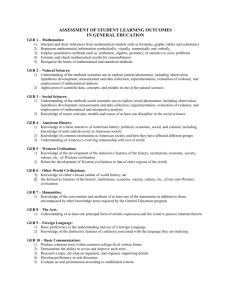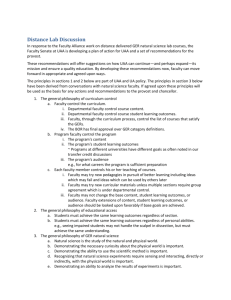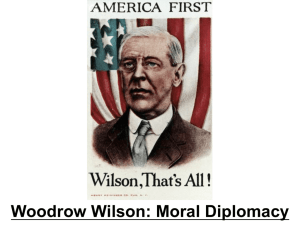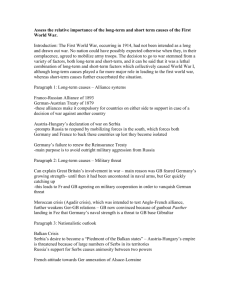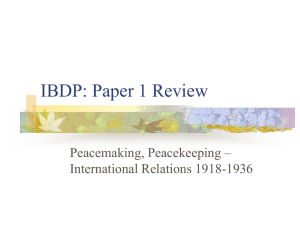Paridhi's Paper 1 notes
advertisement
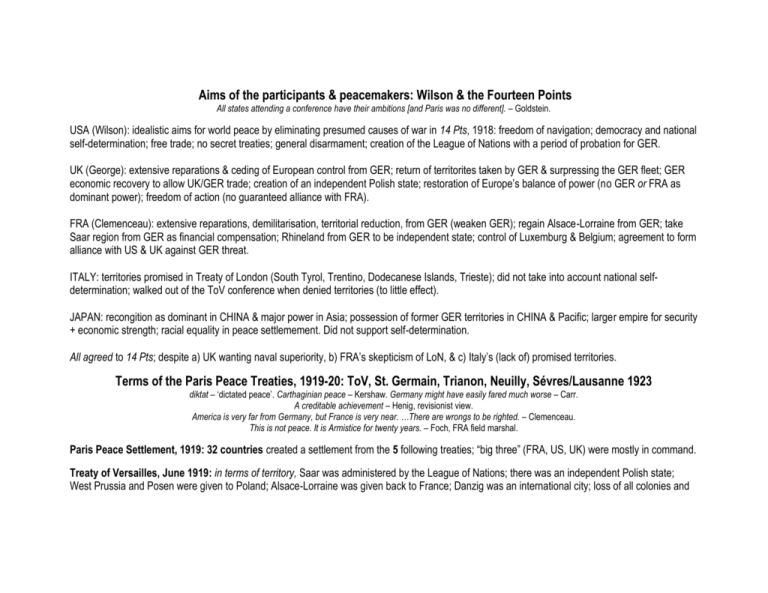
Aims of the participants & peacemakers: Wilson & the Fourteen Points All states attending a conference have their ambitions [and Paris was no different]. – Goldstein. USA (Wilson): idealistic aims for world peace by eliminating presumed causes of war in 14 Pts, 1918: freedom of navigation; democracy and national self-determination; free trade; no secret treaties; general disarmament; creation of the League of Nations with a period of probation for GER. UK (George): extensive reparations & ceding of European control from GER; return of territorites taken by GER & surpressing the GER fleet; GER economic recovery to allow UK/GER trade; creation of an independent Polish state; restoration of Europe’s balance of power (no GER or FRA as dominant power); freedom of action (no guaranteed alliance with FRA). FRA (Clemenceau): extensive reparations, demilitarisation, territorial reduction, from GER (weaken GER); regain Alsace-Lorraine from GER; take Saar region from GER as financial compensation; Rhineland from GER to be independent state; control of Luxemburg & Belgium; agreement to form alliance with US & UK against GER threat. ITALY: territories promised in Treaty of London (South Tyrol, Trentino, Dodecanese Islands, Trieste); did not take into account national selfdetermination; walked out of the ToV conference when denied territories (to little effect). JAPAN: recongition as dominant in CHINA & major power in Asia; possession of former GER territories in CHINA & Pacific; larger empire for security + economic strength; racial equality in peace settlemement. Did not support self-determination. All agreed to 14 Pts; despite a) UK wanting naval superiority, b) FRA’s skepticism of LoN, & c) Italy’s (lack of) promised territories. Terms of the Paris Peace Treaties, 1919-20: ToV, St. Germain, Trianon, Neuilly, Sévres/Lausanne 1923 diktat – ‘dictated peace’. Carthaginian peace – Kershaw. Germany might have easily fared much worse – Carr. A creditable achievement – Henig, revisionist view. America is very far from Germany, but France is very near. …There are wrongs to be righted. – Clemenceau. This is not peace. It is Armistice for twenty years. – Foch, FRA field marshal. Paris Peace Settlement, 1919: 32 countries created a settlement from the 5 following treaties; “big three” (FRA, US, UK) were mostly in command. Treaty of Versailles, June 1919: in terms of territory, Saar was administered by the League of Nations; there was an independent Polish state; West Prussia and Posen were given to Poland; Alsace-Lorraine was given back to France; Danzig was an international city; loss of all colonies and investments; plebiscites in Upper Silesia, West Prussia, and Schleswig. In terms of military, GER army limited to 100,000 military personnel; no airforce, no submarines; v. small fleet: 6 battleships; no compulsory conscription; Rhineland to be occupied for 15 years by the Allied military forces; commissions in Germany to be controlled by the Allies until 1927. In terms of finances, GER to pay £6,600 million for reparations in regular installments in gold and goods; 10% loss of industrial capacity, 48% loss of iron ore industry. War guilt assigned in Article 231 and probation from LoN. Treaty of St. Germaine, Sep. 1919; AUSTRIA: recognised the new independent states; refused to recognise the new Government as a ‘new-state’, so had to pay reparations; accept war guilt and military limitations; lost territory – Istria, Trentino, and South Tyrol to ITALY – and more to Yugoslavia, Czechoslovakia, Poland, and Romania. Treaty resulted in a population change from 22 million to 6.5 million. Treaty of Neuilly, Nov. 1919, BULGARIA: had to pay reparations; military limited to 20,000 men; lost land to Greece, Romania, and Yugoslavia, and access to the Aegean Coastline. Treaty of Trianon, June 1920, HUNGARY: military limited to 35,000 men; had to pay reparations; lost 2/3 of land, population change from 21 million to 7.5 million. Treaty of Sèvres, August 1920, TURKEY: Straits of Dardanelles controlled internationally; Saudi Arabia became independent; lost rights to Sudan and Libya; recognised French Morocco & Tunis, British Egypt & Cyprus; GREECE received land. Revised later in the Treaty of Lausanne (1923): TURKEY got Constantinople back; Greeks were expelled. The geopolitical & economic impact of the treaties on Europe; the establishment & impact of the mandate system The economic crisis… did more than anything else to sour relations between the major states. – Overy. To “aim at the impoverishment” of Germany would lead to “the devastation of Europe”. – Keynes. Economic impact: PPS dealt with no economic questions except reparations and offered no solutions for allied war debt issues or promotion of international trade – trade barriers were an issue, led to the GD. Keynes, among many, maintained that by punishing GER, the Allies were punishing themselves – something that seemed true post-war and in hindsight. Countries struggling to pay off debts to the US resulted in economic instability, tense international relations, and helped contribute to the Ruhr Crisis (1923). International meetings took place but had no effect as US did not want debts cancelled debtors demanded reparations from GER GER struggling with hyperinflation crisis, 1923, where the weak German economy results in lots of paper money printed, so the value goes down and prices rocket skyward, 2,000 printing presses working constantly, the retenmark is introduced US puts into place Dawes Plan, 1924, so GER received an initial loan of $200 million; same total amount of reparations to be paid, but rescheduled and amounts shuffled around; specific GER taxes and bonds were identified and earmarked for that purpose. (US logic: loan to GER GER pay reparations to Allied countries Allies pay debt to US.) GER economy improved, slightly, created tension between FRA & UK – former wanted weak GER & demanded reparations, latter wanted strong GER economy (trade with GER). Young Plan, 1929, reduced GER’s reparations, a lowered annual sum until 1988, and a foreign loan to GER of $300million. GER did very well from 1923-29, became world’s top economy, historian Kitchen argues impression of crippling reparations was a myth; other historians argue it was a conscious political decision to reinforce that myth. How much did GER actually paid? Estimates range from £4-5billion …but GER received £8billion in loans. Geopolitical impact: W. Europe changed little, but E. & Central Europe changed a lot. New states: AUSTRIA, POL, CZECH, HUNGARY, LITHUANIA, etc., etc. scattering of nationalities, racial groups, linguistic groups sometimes ethnic groups were so intermixed, choice had to be made between economic stability of state VS self-determination – very complicated to design states properly; plus, with the creation of many small states created more tension and instability as small states struggled to survive. Trade barriers further complicated issues. Little Entente was created but never achieved full potential due to previous tension. GER lost 12% population, 13% territory; denied self-determination; many GER minorities now in CZECH, POL, AUSTRIA; split into two with Polish Corridor; but stronger than pre-war – no longer encircled by major powers, but rather surrounded by weak, new, small independent states. USSR undergoing the Bolshevik regime; very weak due to civil war + political revolution + lost war against POL & territory to POL led to Treaty of Rapallo, 1922, between GER & USSR, both out of the LoN, financial cooperation & trade + union against POL + secret military agreements (GER tested equipment on USSR territory – avoided ToV restrictions). Mandates: territories transferred from the control of one country to another, Article 22 of LoN. All mandates were previously controlled by defeated states of WW1. Class Class A Class B Class C Definition Independent nations previously controlled by Ottoman Empire, provisionally recognised subject to a lead country until able to have autonomy. Former German territories in Sub-Saharan regions of West & Central Africa, deemed to require greater level of control by a mandatory power (which was forbidden to construct military/naval bases). Essentially colonies. Example Syria (FRA) SYRIA, LEBANON. Mesopotamia (UK) IRAQ. Ruanda-Urundi (BELGIUM) RWANDA, BURUNDI. Samoa went from GER to UK. Impact: ITALY unhappy because no territories OR mandates; FRA & UK got most of the territories; Arabs in Middle East unhappy because no land/independent status – worsened when UK went ahead with the Balfour Declaration of 1917. Enforcement of the provisions of the treaties: US isolationism – the retreat from US/UK Guarantee; disarmament – Washington, London, Geneva conferences Gleichberechtigung “equality of armaments” VS sécurité “security” in armaments. Disarm to the lowest point consistent with national security. – Article 8; “lowest point” was subjective. Universal disarmament was a practical impossibility. – Sir Crowe, Foreign Office minister. Enforcing was difficult because there was little to none coordination/agreement with the major powers – US did not join the LoN and was retreating into isoationism, which led to the US/UK guarantee never happening, which led to tensions between FRA and UK, who also disagreed on GER issues. GER was not part of the LoN and found the treaties too harsh; ITALY was unhappy with the lack of territory; JAPAN was concerned in issues concerning itself, rather than European aspects; USSR was not part of the LoN. LoN did not have any army and major nations were reluctant to supply force! US isolationism began from US not joining the LoN due to Article 10, which stipulated aid of members to assist a member experiencing external aggression, one that the Senate did not support. US did not approve of the US/UK guarantee (a measure of protection for FRA – a firm guarantee of military support from US and UK, UK agreed, but when US did nto accept, UK withdrew as well). US did not want to deal with international affairs. Disarmament: factors for disarmament included the arms race that had led to WW1 (JAPAN + UK could not afford an arms race; US didn’t want to spend), which led to the belief that reducing arms = reducing war threat; rising tension between US and JAPAN over CHINA and trade relations (US didn’t want to lose trade; JAPAN wanted recognition of its dominance) and the Pacific (both felt threatened by the other), which led to UK supporting disarmament, as UK had a defensive alliance with JAPAN and did not want a war with US (which didn’t want a war involving many coutnries); wave of pacifism brought on by WW1; WW1 devastated economy – many nations would suffer greatly in a war. Articles 8 & 9 in the ToV called for disarmament. Washington Conference, 1921-22: conference of the major naval powers and signed a number of treaties – 4-Power Treaty resulted in the end of the UK/JAPAN alliance, and an agreement between UK, JAPAN, US, FRA, to recognise each other’s possessions in Pacific and reach diplomatic solution if there were problems; 5-Power Treaty (same + ITALY) was an agreement to maintain a fixed constant ratio of naval armaments and construct nothing new for the next 10 years – US & UK were not allowed to build new naval bases in W. Pacific; 9-Power Treaty (previous five + CHINA, BELGIUM, NETHERLANDS, POLAND) resulted in open-door policy on CHINA, respect for CHINA’s authority, agreement to discuss problems of common interesst. This was possibly the most successful conference of all. London Naval Conference, 1930, 1935-36: revision + extension of Washington with US, JAPAN, UK, ITALY, FRANCE; ratios changed, agreement on numbers, submarine warfare rules were made stricter, valid until 1936. Second conference met again – resulted in JAPAN leaving, as it was denied equality in terms of ratio of fleets with US & UK – ITALY left, too – was a failure as JAPAN + GER began rearmament programs and there was little point in disarming. Geneva Conference, 1932-34: Optimism gone. The aim was to actualise the ideology of disarmament, took place in Geneva (Switzerland, neutral zone) – by this time, all major powers except the USA had committed to disarmament in the ToV & the Covenant of the LoN. Public pressure for disarmament (international’s women’s campaign for peace). Problems: Germany wanted complete parity, i.e. equality, in forces: either France reduce from 600,000 men to 100,000 men, or Germany had the same number as France. Basically: abolishing or maintaining Article 5. USA wanted the elimination of offensive weapons, however: which weapons were offensive/defensive? 1932 – Germany walked out on the grounds of unequal parity. They convince Germany to come back – “equality of rights in a system which would provide security for all nations” – Germany returns in 1933, but! Hitler is Chancellor! Keep forming proposals that appeal to UK but not to FRA until 1934, where FRA ends participation in the conference. It failed because: self-interest (UK + GER didn’t want Germany to be weak; FRA did; FRA-GER stalemate; US wanted peace); economy + the Great Depression; invasion of Manchuria in 1931 by Japan security threat; invasion of Abyssinia in 1935 by Italy security threat; both invasions made disarmament look foolish; communism could not be tackled with total disarmament; fear of external aggression security threats no disarmament; Article 8: disarm to “lowest point consistent with national safety” subjective level of safety. The League of Nations: effects of absence of major powers; principle of collective security & early attempts at peacekeeping (1920-5) All members undertake to respect and preserve as against external aggression the territorial integrity and political independence of all members. Article 10. Let us at least have the courage of our cynicism. If we flinch every time a test arises, we shall have deserved it. … Treaties, or scraps of paper? Editorial letter, Daily Telegraph. League of Victors. Epiteth for the LoN. LoN: prevent war; resolve conflict by discussing issues in a peaceful manner; humanitarian and economic concerns; supported by pacifists; all those who signed ToV would be members – operated on the principle of collective security, i.e. Article 10. US never joined, which made the LoN seem UK/FRA run (not helped by the treaties); the defeated nations were excluded; collective security depended on collective action but the US was isolationist and the UK was following their example and disagreed with FRA, USSR + GER weren’t participating, ITALY and JAPAN eventually withdrew. The few successes of LoN included the issue of the Aaland Islands (1920-21) with SWEDEN & FINLAND, MOSUL (1923-24) with TURKEY & IRAQ, and averted a GREEK-BULGARIAN clash in 1925. Failed to ensure POL return of Vilna to LITHUANIA (1920), failed to mediate USSR-POL war (1920-21) and GREEK-TURKISH war (1920-23) – the latter was done by the Allies. Collective security failed because of the lack of freedom of action and the problems implicating international relations + the absence of three major powers, US, GER, + USSR + simple logistics (what to do in case of disagreements?). LoN set a poor example – how to resolve conflicts when they couldn’t resolve their own? UK + FRA domination + lack of USA led to = Eurocentric view. Brazil and Spain made a request to their right for permanent status – a compromise was attempted but not to Brazil and Spain’s satisfaction, and they left the LON. Locarno and the “Locarno Spring” (1925) Germany was officially asked to attack the east, in return for peace in the west. – Beck, Polish diplomat. The three powers had reasons to be satisfied with their work, but the reasons were very different. – Kitchen, historian. Locarno, 1925: between FRA, UK, GER, BELGIUM – GER accepts western boundaries, becomes member of LoN, step towards FRA-GER reconciliation, allowed GER to grow economically without being a threat, allowed FRA-UK to reconcile over GER’s treatment (east borders weren’t fixed – led GER to believe it could change those with little objection, which led to W. Europe’s optimism but E. Europe’s dismay). Locarno resulted in a sense of optimism – foreign ministers of GER, UK, and FRA received Nobel Peace Prizes. Hence, the ‘Locarno spring’. Great Depression & threats to international peace & collective security: Manchuria (1931-3) & Aybssinia (1935-6) The economic crisis… did more than anything else to sour relations between the major states. – Overy. You cancelled your words by your deeds and your deeds by your words. – Leon Blum (on the Hoare-Laval Pact). Wall Street Crash, 1929: 16 million shares are greatly reduced by price, prices continued to fall until July 1933, at 15% of their value in October 1929; in 1931-1933, banking crisis hits US and Europe – banks collapsed; governments tried to protect themselves through ‘protectionism’, i.e. raising tariff barriers against imported goods, starting a ‘Tariff War’ – Britain, 1932 created an ‘Imperial Preference System’. World trade fell by 12% in 1929-31, and even by 1938, it was only 40% of 1929 value. Results in worldwide confidence drop in capitalism and parliamentary democracy. GER & JAPAN both suffer unemployment (6million in 1932 fo[ r GER, almost 3million in 1930 for JAPAN) enables authoritarian and dictatorships due to struggling population. International agreements are no longer the focus and self-interest once again becomes priority – survival of the fittest. Collective security was no longer affordable whatsoever. UK + FRA abandoned it for appeasement in the face of increasing GER aggression. Manchuria/Mukden Incident, 1931-33: JAPAN was steadily becoming more militaristic and after the GD, saw Manchuria as a tempting target – large, heavy amount of minerals, and they already had troops there – their unemployment was at almost 3million in 1930; since the 1904-5 RussoJapanese War, JAPAN had control of Korea, by late 1930, held the South Manchurian Railway, and the Southern Peninsula; Liaodong; were worried about warlords of CHINA starting a war with JAPAN (CHINA wanted JAPAN out). JAPAN staged ‘The Mukden incident’, blowing up part of the South Manchurian Railway, blaming on the Chinese, then occupied most of Manchuria, as obviously this was an act of war, fighting escalated, JAPAN used aerial bombing. CHINA responded by withdrawing forces; a truce was signed in 1933. LoN was slow and weak, due to the so-called “complex nature” of CHINA – little sympathy for CHINA from EU due to CHINA’s disdain for EU influence through warlords and took over two years to decide on the issue – JAPAN created a time delay by vetoing the council’s decision – CHINA appealed through Article 15, but eventually LoN voted for “non-recognition” policy, which was effectively doing nothing. JAPAN recognised the ‘new state’ of Manchukuo, claiming it as an independent country, instated a puppet leader & walked out of the LoN in 1933. Abyssinia, 1935-36: Mussolini wanted to link up ITALY’s existing colonies in North-East Africa; to gain revenge for the defeat at Adowa (1896); to satisfy the nationalists who had been angry at ITALY’s failure to acquire colonial rights; to be able to claim to be recreating the glories of the ancient Roman Empire in North Africa. He thought FRA & UK won’t care because FRA said they had no interest in Abyssinia and UK had proposed a deal between Abyssinia and ITALY; the Stresa Front (1935) against the Nazis would be too valuable for FRA + UK to give up over Abyssinia. 1934, staged the Wal-Wal incident - a small military clash – which ITALY refers to LoN, which led to arbitration, while ITALY built forces and in 1935, with troops, invaded. Abyssinia appealed 4 times to the LoN but was ignored. 1935, LoN condemned invasion, voted in favour of economic sanctions – loans, sales (arms, rubber, certain metals) to ITALY banned + importing of ITALIAN goods banned – sanctions failed because they were introduced six weeks after – did not include materials ITALY was concerned about – UK + FRA wanted to have enough pressure without breaking Stresa Front – non LoN countries traded anyway – ITALY barely noticed, ended up taking Abyssinia anyway. ITALY withdrew from LoN; Stresa Front fell apart, GER and ITALY got chummy. The Hoare-Laval Pact, December 1935: Sir Samuel Hoare (Britain) and Pierre Laval (France) reached a secret agreement in Paris that about twothirds of Abyssinia could be offered to Italy in exchange for land from elsewhere. Both UK and FRA were eager to have ITALY rejoin the Stresa Front (a dubious prospect, given that two months after the formation, UK had signed the Anglo-German Naval Agreement, without discussing it with its Stresa partners). This was leaked however, and French-British outcry led to both politicians being sacked. Mussolini conquered Abyssinia in May 1936; the LoN ended its sanctions on Italy in July 1936.
